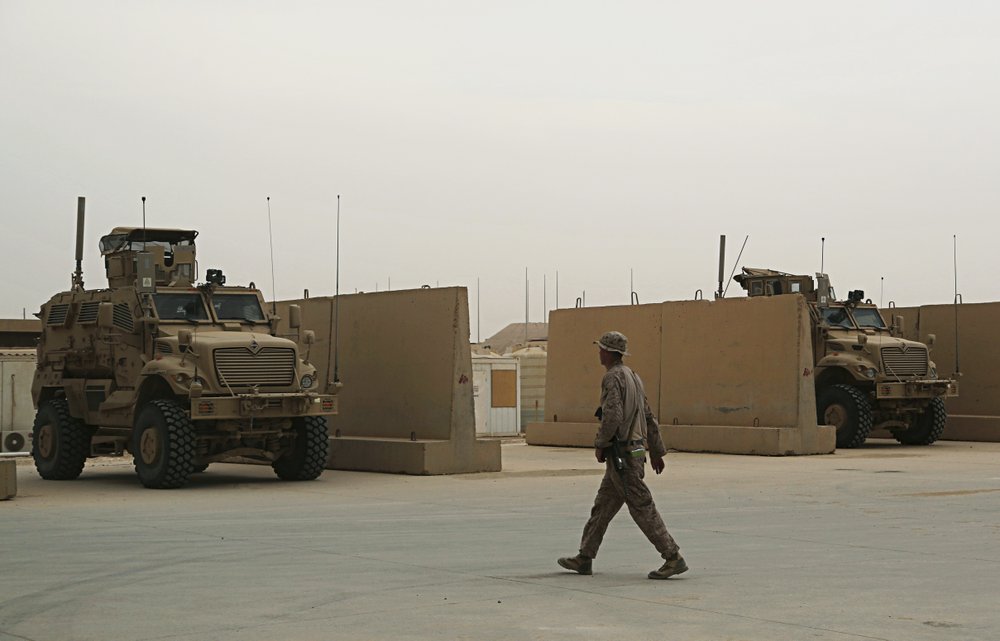Islamabad (People's Daily) - "Worsening of tensions in the Gulf region doesn't serve the interest of anyone. Ensuring peace and stability in the region is of vital importance to the whole world," Chinese Foreign Ministry spokesperson Geng Shuang told a daily press conference on Tuesday.

In this Nov. 8, 2017, file photo, US Marines are stationed in Ain al-Asad air base in Iraq. Iran struck back at the United States for the killing of a top Iranian general early Wednesday, Jan. 8, 2020, firing a series of ballistic missiles at Iraqi bases housing US troops in a major escalation that brought the two longtime foes closer to war. (Photo: AP)
Previously, Geng had said that US military adventurism goes against basic norms governing international relations and aggravates tensions and turbulence in the region, underlining that “power politics is always resented and short-lived.”
The remarks were echoed by stakeholders in the region, where people has suffered too much from decades-long conflicts. It seems that as tensions grow and war fears mount, no one really wants to be involved in a possible all-out war between Washington and Tehran.
Staying away from heightened tensions
Hours after the US killing of top Iranian commander Qasem Soleimani in response to an alleged Iran-sponsored attack on the US embassy in Iraq, the Pakistani Foreign Ministry said in a statement that "the recent developments seriously threaten peace and stability in the region", urging all parties to exercise maximum restraint and engage constructively to deescalate the situation.
Pakistan's top diplomat Shah Mahmood Qureshi on Sunday also reaffirmed his counterparts from Saudi Arabia, Iran, UAE and Turkey that Pakistan will not become part of any regional conflict.
"The killing of Soleimani poses a serious risk to peace in the region," Turkish Foreign Minister Mevlut Cavusoglu said on Monday, saying the country will work to reduce US-Iran tensions, Turkish state-run Anadolu Agency reported.
Even Israel, the US' closest ally in this region, is trying to downplay its support for the US military action, despite its prime minister Benjamin Netanyahu’s earlier praise of Trump for "acting swiftly, forcefully and decisively" in ordering the strike killing Soleimani, according to Reuters.
On Tuesday, Israeli Energy Minister Yuval Steinitz, a member of the country's security cabinet, was quoted by Reuters as saying that Israel is not involved in the US-Iran tensions, that it is "standing on the sidelines and observing events."
Confrontations may lead to war
"We took action last night to stop a war," Trump said last Friday in front of reporters in addressing Soleimani's killing.
"We are a peace-loving nation and my administration remains firmly committed to establishing peace and harmony among the nations in the world," the US president said.
Trump's nicely-worded self-defense failed to achieve the desired effect. The decision to kill Iran's top commander has drawn widespread criticism, both at home and abroad. Senate Minority Leader Chuck Schumer said on Tuesday that Trump's decision-making has been "erratic and impulsive."
Iran's Islamic Revolution Guard Corps (IRGC) on Wednesday targeted US bases in Iraq, including al-Asad and Harir Camp to the north of Erbil, with a second wave of surface-to-surface missiles.
Iran fired as many as 15 ballistic missiles into Iraq, of which 10 missiles hit al-Asad Airbase, one hit a military base in Erbil, and four failed to hit their targets, US officials said.
As tensions continue to grow, observers are worried that escalating conflicts may lead to war. British journalist Owen Bennett-Jones wrote, "the next few weeks will test the two sides' rationality."
Since the seismic news of Soleimani's killing, diplomatic efforts has been made by the international community, especially the other five signatories to the Iran nuclear deal, in a bid to cool down the soaring tensions.
Chinese Foreign Minister Wang Yi exchanged views and coordinated stances with Russian Foreign Minister Sergei Lavrov in a phone call late Saturday over the escalating tensions in the Gulf region. The leaders of Germany, France and Britain made a joint statement on Sunday, calling on Iran to "refrain from further violent action or proliferation."
According to British newspaper the Independent, oil prices could double to $150 per barrel if war breaks out in the Gulf, as "Tehran could block off the vital Straits of Hormuz, an artery through which around a fifth of the world's oil supplies travel."
"In case of a full-blown war, the Islamic Republic will have to face even greater hardships, something it cannot afford with an already enfeebled economy," the Dawn newspaper said in an editorial on Tuesday.


